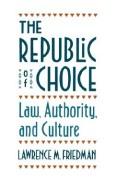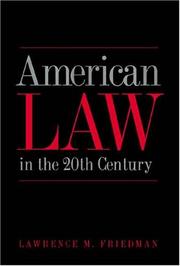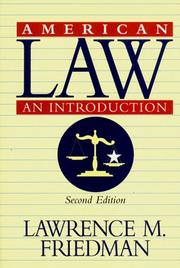| Listing 1 - 10 of 47 | << page >> |
Sort by
|

ISBN: 0135266084 0135266165 Year: 1977 Publisher: Englewood Cliffs, N.J. Prentice-Hall
Abstract | Keywords | Export | Availability | Bookmark
 Loading...
Loading...Choose an application
- Reference Manager
- EndNote
- RefWorks (Direct export to RefWorks)

ISBN: 0674762606 Year: 1990 Publisher: Cambridge, Mass. Harvard University Press
Abstract | Keywords | Export | Availability | Bookmark
 Loading...
Loading...Choose an application
- Reference Manager
- EndNote
- RefWorks (Direct export to RefWorks)
Legal theory and methods. Philosophy of law --- Civil rights. --- Culture and law. --- Individualism. --- Law --- Sociological jurisprudence. --- Philosophy.

ISBN: 0671815911 0671528076 Year: 1985 Publisher: New York, NY : Simon & Schuster Macmillan,
Abstract | Keywords | Export | Availability | Bookmark
 Loading...
Loading...Choose an application
- Reference Manager
- EndNote
- RefWorks (Direct export to RefWorks)
34 <09> --- Rechtsgeschiedenis --(algemeen) --- Law --- History. --- 34 <09> Rechtsgeschiedenis --(algemeen) --- History --- History and criticism --- Droit --- Histoire

ISBN: 1281734640 9786611734640 0300135025 9780300135022 0300091370 9780300091373 9781281734648 6611734643 0300102992 9780300102994 Year: 2002 Publisher: New Haven
Abstract | Keywords | Export | Availability | Bookmark
 Loading...
Loading...Choose an application
- Reference Manager
- EndNote
- RefWorks (Direct export to RefWorks)
In this long-awaited successor to his landmark work A History of American Law, Lawrence M. Friedman offers a monumental history of American law in the twentieth century.The first general history of its kind, American Law in the Twentieth Century describes the explosion of law over the past century into almost every aspect of American life. Since 1900 the center of legal gravity in the United States has shifted from the state to the federal government, with the creation of agencies and programs ranging from Social Security to the Securities Exchange Commission to the Food and Drug Administration. Major demographic changes have spurred legal developments in such areas as family law and immigration law. Dramatic advances in technology have placed new demands on the legal system in fields ranging from automobile regulation to intellectual property.Throughout the book, Friedman focuses on the social context of American law. He explores the extent to which transformations in the legal order have resulted from the social upheavals of the twentieth century--including two world wars, the Great Depression, the civil rights movement, and the sexual revolution. Friedman also discusses the international context of American law: what has the American legal system drawn from other countries? And in an age of global dominance, what impact has the American legal system had abroad?Written by one of our most eminent legal historians, this engrossing book chronicles a century of revolutionary change within a legal system that has come to affect us all.
Law --- Acts, Legislative --- Enactments, Legislative --- Laws (Statutes) --- Legislative acts --- Legislative enactments --- Jurisprudence --- Legislation --- History

ISBN: 0300147201 0585363293 9780585363295 9780300147209 0300075456 9780300075458 0300075456 Year: 1999 Publisher: New Haven, Conn. Yale University Press
Abstract | Keywords | Export | Availability | Bookmark
 Loading...
Loading...Choose an application
- Reference Manager
- EndNote
- RefWorks (Direct export to RefWorks)
Modern technology has radically and irretrievably altered our sense of identity and hence our social, political, and legal life, argues Lawrence M. Friedman in this bold new book. In traditional societies, he explains, relationships and identities were strongly vertical: there was a clear line of authority from top to bottom, and identity was fixed by one's birth or social position. But in modern society, identity and authority have become much more horizontal: people feel freer to choose who they are and to form relationships on a plane of equality.Friedman examines how modern life centers on human identity seen in terms of race, gender, ethnicity, and religion, and how this new way of defining oneself affects politics, social structure, and the law. Our horizontal society, he says, is the product of the mass media-in particular, television-which break down the isolation of traditional life and allow individuals to connect with like-minded others across barriers of space and time. As horizontal groups blossom, loyalties and allegiances to smaller groups fragment what seemed to be the unity of the larger nation. In addition, the media's ability to spread a global mass culture causes a breakdown of cultural isolation that leads to more immigration and heavy pressure on the laws and institutions of citizenship and immigration.
Group identity. --- Ethnicity. --- Social values. --- Social history --- Group identity --- Ethnicity --- Social values --- Sociology & Social History --- Social Sciences --- Social Change --- Collective identity --- Community identity --- Cultural identity --- Social identity --- Identity (Psychology) --- Social psychology --- Collective memory --- Values --- Ethnic identity --- Cultural fusion --- Multiculturalism --- Cultural pluralism --- Descriptive sociology --- Social conditions --- History --- Sociology --- Social history.
Book
ISBN: 0804771081 9780804771085 9780804760362 9780804762090 0804760365 0804762090 Year: 2009 Publisher: Stanford, Calif. Stanford Law Books
Abstract | Keywords | Export | Availability | Bookmark
 Loading...
Loading...Choose an application
- Reference Manager
- EndNote
- RefWorks (Direct export to RefWorks)
The law of succession rests on a single brute fact: you can't take it with you. The stock of wealth that turns over as people die is staggeringly large. In the United States alone, some
Inheritance and succession --- Bequests --- Descent and distribution --- Descents --- Hereditary succession --- Intestacy --- Intestate succession --- Law of succession --- Succession, Intestate --- Real property --- Universal succession --- Trusts and trustees --- History. --- Social aspects --- Law and legislation
Book
ISBN: 9780674972469 0674972465 9780674971059 0674971051 0674972449 Year: 2016 Publisher: Harvard University Press
Abstract | Keywords | Export | Availability | Bookmark
 Loading...
Loading...Choose an application
- Reference Manager
- EndNote
- RefWorks (Direct export to RefWorks)
Laws and regulations are ubiquitous, touching on many aspects of individual and corporate behavior. But under what conditions are laws and rules actually effective? A huge amount of recent work in political science, sociology, economics, criminology, law, and psychology, among other disciplines, deals with this question. But these fields rarely inform one another, leaving the state of research disjointed and disorganized. Lawrence M. Friedman finds order in this cacophony. Impact gathers recent findings into one overarching analysis and lays the groundwork for a cohesive body of work in what Friedman labels “impact studies.” The first important factor that has a bearing on impact is communication. A rule or law has no effect if it never reaches its intended audience. The public’s fund of legal knowledge, the clarity of the law, and the presence of information brokers all influence the flow of information from lawmakers to citizens. After a law is communicated, subjects sometimes comply, sometimes resist, and sometimes adjust or evade. Three clusters of motives help shape which reaction will prevail: first, rewards and punishments; second, peer group influences; and third, issues of conscience, legitimacy, and morality. When all of these factors move in the same direction, law can have a powerful impact; when they conflict, the outcome is sometimes unpredictable.
Effectiveness and validity of law. --- Law --- Obedience (Law) --- Compliance. --- Sociological jurisprudence. --- Law and society --- Society and law --- Sociology of law --- Jurisprudence --- Sociology --- Law and the social sciences --- Compliant behavior --- Conformity --- Cooperativeness --- Psychology --- Legal obligation --- Obligation, Legal --- Obligation to obey the law --- Juridical psychology --- Juristic psychology --- Legal psychology --- Psychology, Juridical --- Psychology, Juristic --- Psychology, Legal --- Psychology, Applied --- Therapeutic jurisprudence --- Acts, Legislative --- Enactments, Legislative --- Laws (Statutes) --- Legislative acts --- Legislative enactments --- Legislation --- Validity and effectiveness of law --- International law --- Social aspects. --- Psychological aspects. --- Philosophy
Book
ISBN: 1108588816 1108686672 1108619762 1108427537 1108446280 Year: 2018 Publisher: Cambridge : Cambridge University Press,
Abstract | Keywords | Export | Availability | Bookmark
 Loading...
Loading...Choose an application
- Reference Manager
- EndNote
- RefWorks (Direct export to RefWorks)
In this compelling book, Lawrence M. Friedman looks at situations where killing is condemned by law but not by social norms and, therefore, is rarely punished. He shows how penal codes categorize homicides by degree of intent, which are in turn based on society's sense of moral outrage. Despite being officially defined as murder, many homicides have historically gone unpunished. Friedman looks at early vigilante justice, crimes of passion, murder of necessity, mercy killings, and assisted suicides. In his explorations of these unpunished homicides, Friedman probes what these circumstances tell us about conflicts in social and cultural norms and the interaction of law and society.
Murder --- Homicide --- LAW / Criminal Law / General. --- Femicide --- Offenses against the person --- Violent deaths --- Criminal homicide --- Killing (Murder) --- Law and legislation --- History. --- Social aspects
Book
Year: 1965 Publisher: Madison (Wis.) : University of Wisconsin press,
Abstract | Keywords | Export | Availability | Bookmark
 Loading...
Loading...Choose an application
- Reference Manager
- EndNote
- RefWorks (Direct export to RefWorks)

ISBN: 0393046109 Year: 1998 Publisher: New York (N.Y.) : Norton,
Abstract | Keywords | Export | Availability | Bookmark
 Loading...
Loading...Choose an application
- Reference Manager
- EndNote
- RefWorks (Direct export to RefWorks)
| Listing 1 - 10 of 47 | << page >> |
Sort by
|

 Search
Search Feedback
Feedback About UniCat
About UniCat  Help
Help News
News